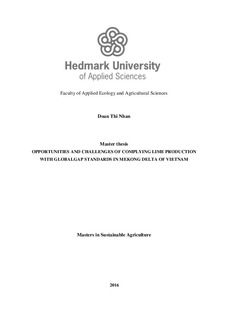| dc.description.abstract | Lime has been commonly cultivated in Vietnam for a long time. Its produce is exported to many countries around the world. Growers use more and more pesticide and fertilizer on their lime farm to protect the crop and increase their productivity. Therefore, the lime production causes many effects for the health of human and environmental issues. Nowadays, the issue of the food safety hygiene is concerned much more than they did in the past. In particular, the traceability of products, the levels of allowed residue pesticide, and the environment issues are set for producers. The EU is the largest which is the strict market with many rules. The complex standards will circle the food safety hygiene and social responsibility. The obstacle to the exporter of Vietnam’s fruits is a guarantee of the quality of the fruits as well as to meet the standard requirements and market needs. To analyze this, a project was conducted to explore the implication of GlobalGAP standard for lime in Mekong Delta of Vietnam. This project has studied the knowledge of the producers and risk awareness to get an understanding of the growers under GlobalGAP standard. Moreover, this study also has analyzed the essential factors influencing the adoption of farmers to comply with the standard. Finally, it has been identifyed the benefits and difficulties of implementation of good agricultural practice. A questionnaire was designed to interview GlobalGAP and non-GlobalGAP farmers. About 30 GlobalGAP and 44 non-GlobalGAP farmers in Long An and Hau Giang province in the Mekong Delta, Vietnam were interviewed in 2015. The descriptive statistic, backward selection model, and SWOT analysis to analyze data. The research indicates that GlobalGAP farmers are aware of safe production. They applied allowed pesticide and herbiside list. Furthermore, backward selection model also shows that the compliance with GlobalGAP standards was influenced by the education level of farmers and external factors such as support policies, buyers, and the price of the lime production. Besides, the GlobalGAP farmers’ awareness of health and environmental protection became better than non-GlobalGAP farmers did. They applied less fertilizer and used organic fertilizer to improve soil structure. However, the high costs of compliance are identified a major constraint to GlobalGAP producers, especially to small-scale farmers. | nb_NO |
